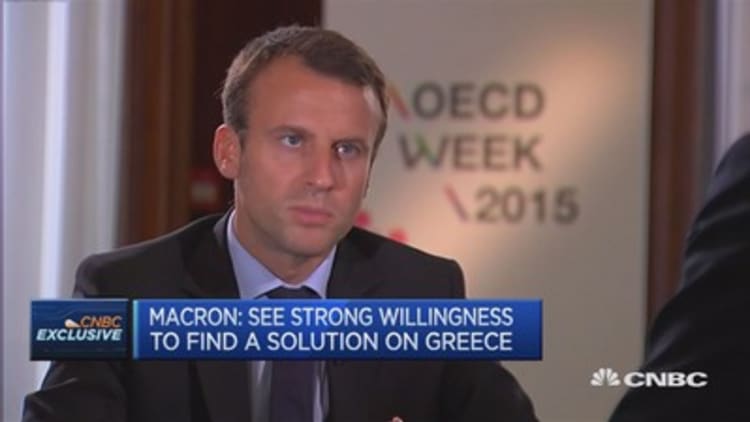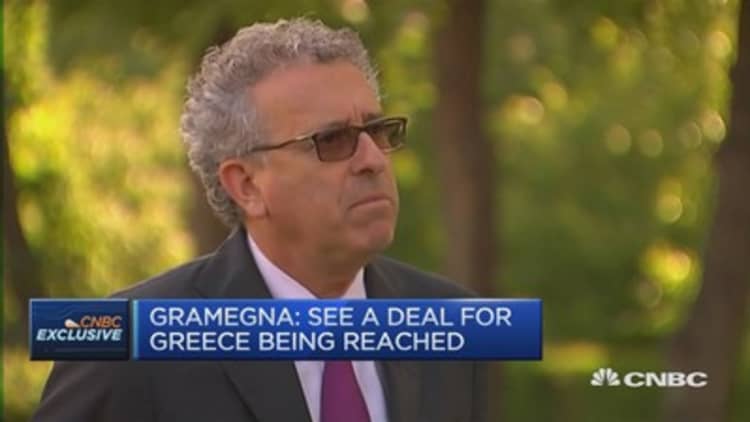The Greek government has reportedly offered to hike taxation on swimming pools, helicopters and speedboats in its effort to strike a reforms-for-aid deal with its international bailout supervisors.
A 47-page report, purported to be the reform proposals sent by Athens to international officials this week, was posted on Greek news website enikos.gr on Thursday.
The document proposes hiking taxes on luxury items such as planes, helicopters, gliders and swimming polls to 13 percent from 10 percent. It also suggests a tax on "recreational vessels in access of 10 meters."
The document also gives primary surplus targets from 2015 to 2022 and details how Greece will raise its average retirement age.
A press representative from the Greek prime minister's office told CNBC that the document was "likely" to be official, but was unable to say so for sure. However, European news organizations such as the U.K.'s Guardian newspaper reported the proposals as fact.
Greece, creditors swap preposals
Athens' proposals are just one side of the story, however, with Greece's creditors suggesting their own for the struggling nation.
On Thursday, Greece asked to bundle its four debt payments to the IMF due in June so that it can pay them all together at the end of the month, according to Greek newspaper Kathimerini.
The request is expected to be approved by the IMF, the newspaper said. That would mean Greece does not have to pay the first tranche of 300 million euros that falls due on Friday.
A deal between cash-strapped Greece and its lenders over reforms is apparently "close," but differences over the detail—and questions over whether they can be reconciled—still remain.
Hopes of an agreement between Greece and the bodies overseeing its aid—the European Commission, European Central Bank (ECB) and International Monetary Fund (IMF)—were raised on Wednesday after the lenders appeared to be ready to compromise, offering Greece room for maneuver on certain aspects of its bailout program.
Read MoreEuropean stocks close lower, Greece in spotlight
As details of creditors' proposals emerged on Wednesday, Greek Prime Minister Alexis Tsipras traveled to Brussels to meet with the Commission President, Jean-Claude Juncker, to discuss the ongoing impasse between the two sides over reforms and the future of Greece's bailout.
On Thursday Tsipras announced that he would not be in Brussels on Friday, as previously planned, to continue negotiations, an EU official said.
"There will be no meeting tomorrow. The Greeks last night agreed to send a compromise on how to solve the few outstanding issues. They did not. So tomorrow no meeting is possible," the official said.
"The bundling of payments is not a good sign, it will be difficult from here on," the EU official said.
After the meeting, Juncker said that some progress had been made, but that it was insufficient.
Tsipras said a deal was "close" and that the talks were "constructive." But he insisted that Greece's alternative proposals and ideas were the most viable.
"We exchanged views and, at the end of the day, the realistic proposals on the table are those of the Greek government. We have a basis to discuss them and this is the optimistic thing out of the discussions," he said.
Common ground was found over lowering the primary budget surplus requirement for Greece, Tsipras said, but differences remained over some pension and taxation changes.
French Economy Minister Emmanuel Macron told CNBC in Paris Wednesday that Europe's leaders were committed to "find(ing) a solution to keep Greece in the euro zone," but that this required equal commitment from the Greek government.

"Mr Tsipras is completely aware of his chance and will have to take his responsibilities and propose some measures to meet his commitments," Macron added.
'Bridge the gap'
Following Wednesday's meeting, Juncker said the "intense work" would continue—a sentiment echoed by Luxembourg's Finance Minister.
"There is a last effort here to bridge the gap between Greek proposals and what euro zone members want, which is a global framework that is consistent with stability and growth," Pierre Gramegna told CNBC Wednesday.
"This is the last effort and it seems the President of the Commission will try to find a solution with Mr Tsipras. I think it is key that a solution is found because we—Greece and the Eurogroup—have the same goal that Greece should stay in the euro zone," he added.

Christine Lagarde, the managing director of the International Monetary Fund welcomed the constructive meeting on Wednesday. In a press conference on Thursday afternoon she said that it opened up time for details of joint proposals.
Read MoreTime to talk about capital controls in Greece
European markets ticked lower as the Greek drama continued on Thursday, and Craig Erlam, a senior market analyst at foreign exchange firm OANDA, said in a note that focus was now on whether the gaps between lenders could be bridged.
"While both sides remain in disagreement over some key issues, progress does seem to be being made," he said in a note, but added that as there was still some way to go he "refused" to get too optimistic.
"The messages coming from the talks are extremely mixed and even the creditors can't agree on a consistent stance," he said. "I guess we should be taking all comments with a pinch of salt at the moment and just recognize that this is an improvement on the rhetoric coming from both camps prior to a couple of weeks ago. That alone is reason for optimism."
Deferring debt
Being flexible over reforms could be critical for Greece as it looks to avoid defaulting on its immediate and forthcoming debts to the IMF and ECB.
On Friday, Greece is due to pay the IMF 300 million euros ($335 million)—a payment that has looked increasingly unlikely as talks drag on, Greece's money runs out and a final tranche of bailout aid remains out of reach.
A spokesman for Greece's ruling Syriza party raised the possibility that Athens could defer the IMF debt.
Read MoreGreece has two options: A deal or chaos
"If there is no prospect of a deal by Friday or Monday, I don't know by when exactly, we will not pay," Nikos Filis told Mega TV on Wednesday, Reuters reported.
CMC Markest analyst Michael Hewson said there were hopes that enough common ground could be found to be able to see the IMF debt "either paid on time or at least deferred without too much fuss and rolled up into the remaining repayments later this month, in the almost certain probability that a deal can't be concluded this week."
"Tsipras' comments last night that a deal was close were encouraging, but we've been here before so probably better to not set the bar too high," he said, adding, "the divide between Greece and the creditors still remains quite wide."
—Reuters contributed to this report.




